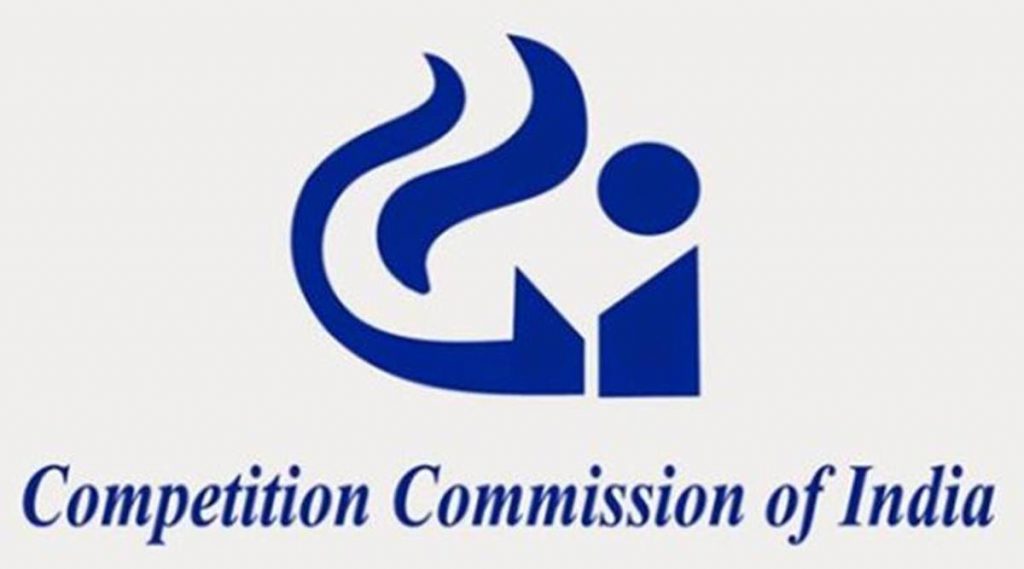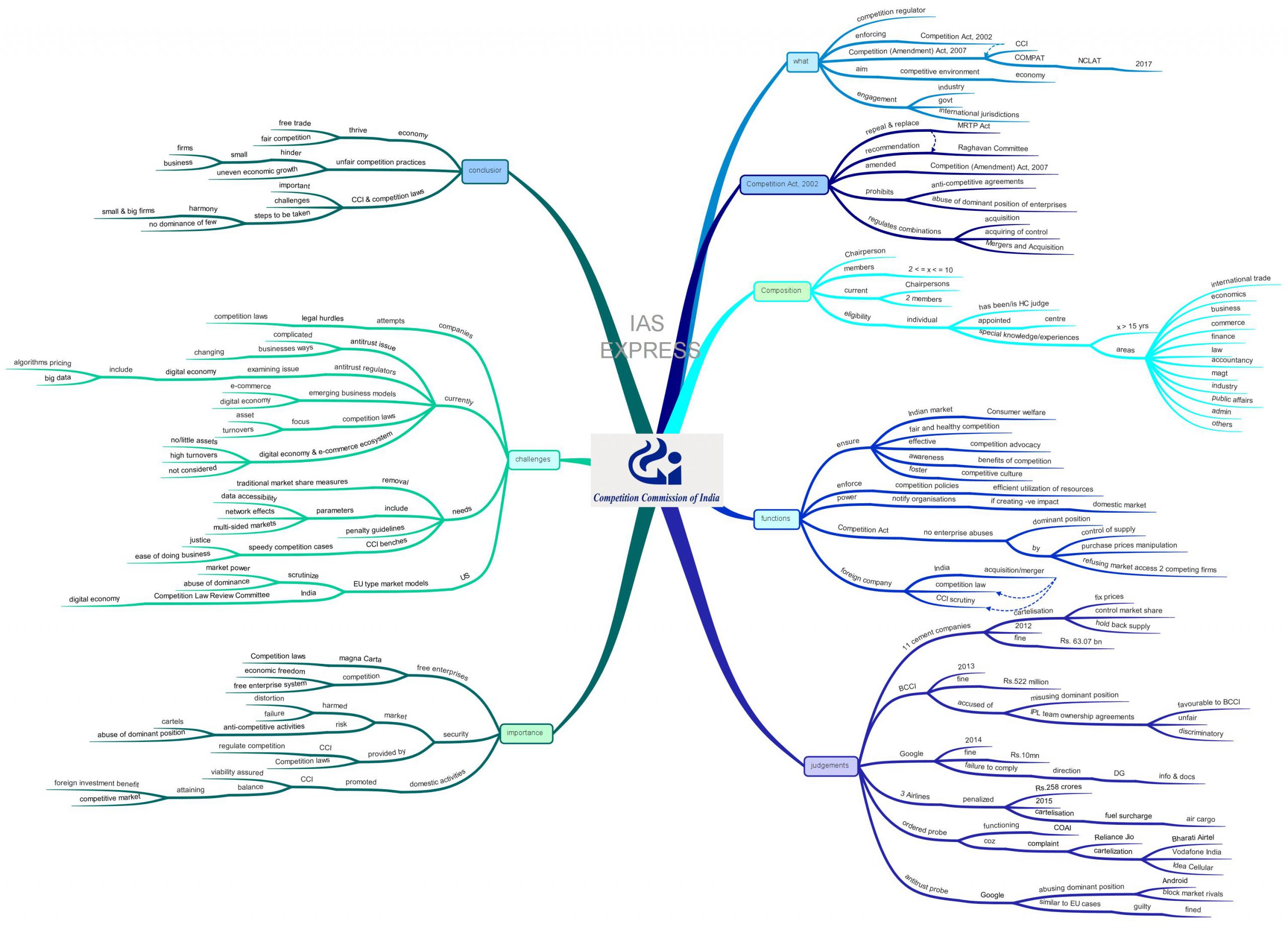Competition Commission of India (CCI): Need, Composition, Functions, Challenges

The Competition Commission of India (CCI) had turned a decade old recently. 10 years since its establishment, the Commission is undertaken numerous measures to assure ease and freedom of trade and prevention of unfair practices in the Indian market. However, the current development of technology and business models is posing new and varied challenges to the CCI.
This topic of “Competition Commission of India (CCI): Need, Composition, Functions, Challenges” is important from the perspective of the UPSC IAS Examination, which falls under General Studies Portion.
What is the Competition Commission of India?
- Competition Commission of India (CCI) is India’s competition regulator.
- It is a statutory body in charge of enforcing the Competition Act, 2002 which received the President’s assent in 2003.
- This Act was amended by the Competition (Amendment) Act, 2007.
- This led to the establishment of the CCI and the Competition Appellate Tribunal.
- Its aim is to establish a competitive environment in the Indian economy.
- This is done through proactive engagement with all the stakeholders, including industry, the government, and international jurisdictions.
What is Competition Act, 2002?
- The Monopolies and Restrictive Trade Practices Act, 1969 (MRTP Act) was repealed and replaced by the Competition Act, 2002, in accordance with the recommendations by Raghavan Committee.
- This Act was amended by the Competition (Amendment) Act, 2007.
- The provisions of the Act relating to the anti-competitive agreements and abuse of dominant position were notified on May 20, 2009.
- This Act prohibits anti-competitive agreements and abuse of a dominant position of enterprises.
- It also regulates combinations (acquisition, acquiring of control and Mergers and Acquisition) that may cause substantial adverse effects on the competition within India.
- As previously mentioned, through the Amendment Act, the Competition Commission of India and Competition Appellate Tribunal have been established.
- The Indian government had replaced the Competition Appellate Tribunal (COMPAT) with the National Company Law Appellate Tribunal (NCLAT) in 2017.
What is the Composition of CCI?
- The CCI consists of:
- Chairperson
- Not less than two and not more than 10 members who shall be appointed by the Centre.
- Currently, the CCI has a Chairperson and two members.
- The commission’s Chairperson and other members shall be full-time Members.
- Eligibility: The Chairperson and every other Member should be a person of ability, integrity, and standing and who, has been, or is qualified to be a judge of a High Court, or has special knowledge of, and profession experience not less than 15 years in international trade, economics, business, commerce, law, finance, accountancy, management, industry, public affairs, administration or in any other matter which, in the opinion of the Central Government, may be useful to the commission.
What are the functions of CCI?
- The functions of CCI include:
- Making sure that the Indian market works for the benefit and welfare of the consumers.
- Ensuring fair and healthy competition in the economic activities of the nation for faster and inclusive economic growth and development.
- Execution of competition policies that enables the efficient utilization of economic resources.
- Effective undertaking competition advocacy.
- Spreading awareness on the benefits of competition among the stakeholders to create and foster competition culture in the Indian economy.
- The CCI is an antitrust ombudsman for smaller organisations which are not able to defend themselves against large corporations.
- It also has the power to notify organisations that sell in India if it feels they are creating negative impacts on competition in India’s domestic market.
- The Competition Act ensures that no enterprise abuses its dominant position in the market through the control of supply, manipulation of the purchase prices or adopting practices that may refute market access to other competing firms. The CCI is in charge of enforcing this law.
- A foreign company that seeks entry into India through an acquisition or merger should abide by India’s competition laws and will come under the scrutiny of CCI.
Judgements by CCI:
- The CCI had imposed a fine of Rs. 63.07 billion on 11 cement companies for cartelisation in June 2012. These companies were accused of meeting regularly to fix prices, control market share and hold back supply, leading to them gaining illegal profits.
- The CCI imposed a penalty on the Board of Control for the Cricket in India (BCCI) in 2013 for misusing its dominant position. It was found that the IPL team ownership agreements were unfair and discriminatory. The terms of the IPL franchise agreements were highly in favour of the BCCI and franchises had no say in terms of the contract.
- A fine of Rs.10 million was imposed upon Google in 2014 due to its failure to comply with the directions given by the Director General (DG) seeking information and documents.
- The CCI imposed fine of Rs.258 crores on 3 Airlines in 2015. These 3 Airlines were penalized for cartelisation in determining the fuel surcharge on air cargo.
- CCI had also ordered probe into the functioning of the Cellular Operators Association of India (COAI) in response to the complaint filed by Reliance Jio against the cartelization by its rivals: Bharati Airtel, Vodafone India and Idea cellular.
- The Commission had also ordered an antitrust probe against Google for abusing its dominant position with Android to block its market rivals. This probe is based on the analysis of a similar case in the European Union where Google was found guilty and was fined. The Commission had sent letters to the handset makers in 2019, seeking details of the terms and conditions of their agreements Google. This is to see whether or not Google had imposed any restriction on these companies for the company’s apps in the past 8 years since 2011.
Why do we need Competition laws?
- Uphold free enterprise: The Competition laws have been described as the Manga Carta of free enterprise. Competition plays a significant role in preserving economic freedom and the free enterprise system.
- Security against market distortions: These laws are necessary to prevent the market from being harmed due to failures and distortions, and there is a constant risk of various players resorting to anti-competitive activities such as cartels and abuse of dominant position in the market, etc. These activities can adversely impact economic efficiency and consumer welfare. Therefore, there is a need for competition laws and CCI as it acts as a regulative force that can establish control over economic activities.
- Promotion of domestic activities: During the era of the domination of globalisation, there is a need for an effective competition law and commission that can ensure the continued viability of the domestic industries while also carefully balancing the attaining of the foreign investment benefit and competitive market.
What are the challenges faced by CCI?
- There are both internal as well as external challenges while implementing the competition law.
- There are also attempts made by the companies to create legal hurdles in implementing the competition law.
- The antitrust issue of the current era is constantly changing and there is also the change in the ways in which the businesses are undertaken. This constant and continuous change is proving to be of great challenge to the CCI.
- Currently, the antitrust regulators across the world are examining the issues involving the digital economy. This is proving to be highly difficult as it includes algorithm pricing, big data etc.
- This calls for the hiring of data scientists to work with competition regulators.
- The emerging business models around the digital economy and e-commerce is currently posing as a challenge.
- There is need for understanding these models comprehensively.
- Presently, the competition laws talks of assets and turnovers.
- The entire digital economy and e-commerce ecosystem, in terms of assets, there may be nothing, but the turnovers are pretty high.
- For getting a better understanding of the new age areas like e-commerce and digital economy, the commission is currently undertaking market surveys. This survey will also look into certain new markets like algorithms and digital platform network.
- Now, it seems necessary to move away from traditional measures of market shares to include parameters like data accessibility, network effects, and multi-sided markets.
- In this context, the US is moving towards an EU-type competition model that scrutinizes the company’s market power and abuse of dominance.
- Thus, recently, the US House Judiciary Committee had initiated an investigation to assess the effectiveness of the current antitrust laws regulating the technology companies.
- The Indian Government too has established the Competition Law Review Committee.
- This committee focuses on the issues related to the digital economy.
- Furthermore, there is a need for formulation of penalty guidelines by the regulator so that it acts as a barometer to guide the industries.
- The CCI has the nationwide relevance and in particular, the majority of the CCI matters arise in Mumbai.
- Therefore, there is also the need for setting up of benches of the CCI to speedily decide on the competition cases.
- This is necessary in order to facilitate wider access to the justice and ease of doing business in India.
Conclusion:
An economy can thrive only if there are free trade and fair competition in the market. Unfair competition practices like monopolies; cartels etc. can hinder the growth of smaller firms and businesses, leading to uneven growth and development. Thus, CCI and Competition laws play a significant role in the Indian economy. However, the current era’s new developments are posing as challenges to the CCI. Steps must be taken by the commission so that both the small and big firms co-exist harmoniously in the market and that there is no dominance of a few firms in the market.


